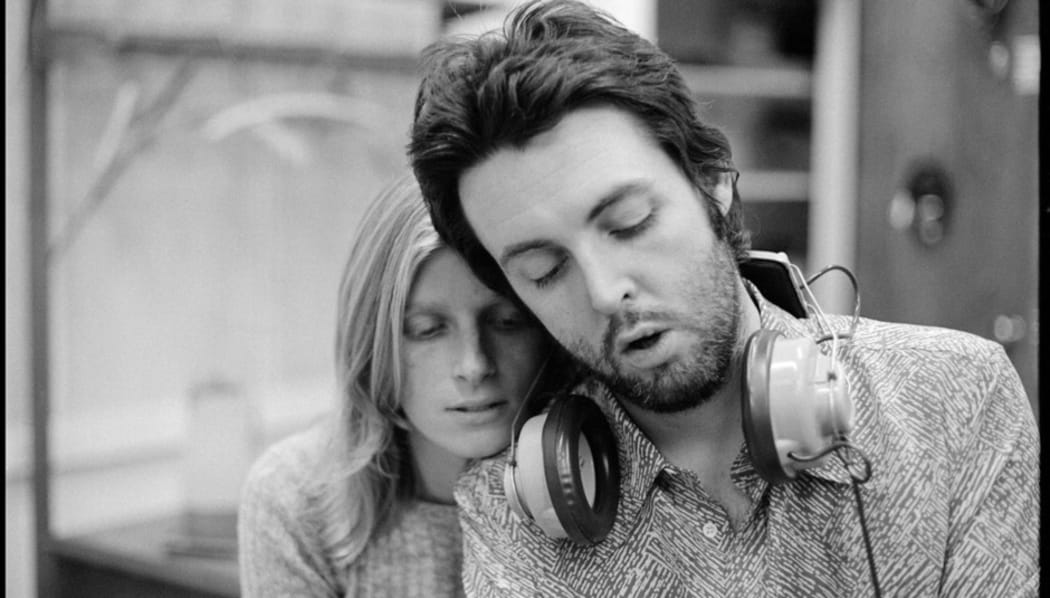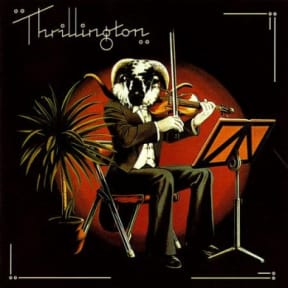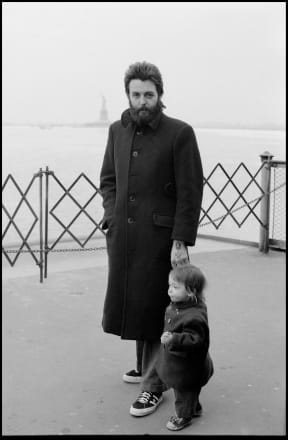Nick Bollinger considers a curiosity from the cabinet of Paul McCartney.

Linda and Paul McCartney Photo: supplied
Instrumental versions of Beatles’ songs weren't uncommon in the 60s. Everyone had a go at them, from the Berlin Philharmonic to Count Basie. And it’s not so remarkable that someone in 1971 would record an orchestral version of the latest Paul McCartney album. What was a little odd, though, was that this record was essentially made by McCartney himself. In June 1971 – with the Ram album just released – McCartney oversaw the re-recording of the entire album, in a swinging big band style.

Thrillington Photo: supplied
A slow blues like ‘3 Legs’ lends itself pretty naturally to the slinky brassy arrangement you'll find here. But one is reminded all over again of McCartney’s genius as a composer of melody when it comes to the cascading vocal counterpoints of ‘Dear Boy’, or the theme of 'Uncle Albert/Admiral Halsey' - a melody that says 'we're so sorry' even without the lyrics - played here on recorders.
The album was recorded at Abbey Road – legendary site of the Beatles’ recordings – and overseen by McCartney, though he doesn’t appear to actually perform on it. The bass playing, while McCartney-esque, is by noted session player Herbie Flowers (most famous for his twin basslines on Lou Reed’s ‘Walk On The Wild Side’). The drummer is the similarly esteemed sideman Clem Cattini.
As for the orchestrations, these were written by arranger Richard Hewson, fresh at the time from his work on The Beatles’ posthumous Let It Be, album, which was completed to McCartney’s disapproval by Phil Spector. McCartney has let it be known that, among other things, he abhorred the addition of lush strings to his song ‘The Long and Winding Road’.
But he can’t have held too much of a grudge against Hewson, nor underrated his talents, as he seems to have given him full license to orchestrate songs like these, sometimes with fruity results; sometimes just weird ones.
Hewson wasn’t the only person with previous Beatle connections to play a part in the recordings. Where vocals were required, McCartney contracted the services of The Mike Sammes Singers, whose previous credits included chanting the ‘oopah oompah stick it up your jumper’ line on ‘I Am The Walrus’. McCartney couldn’t come up with anything quite as absurd for them here, still they are an audible presence.

Percy Thrillington and friend Photo: supplied
For the album’s release, McCartney devised an elaborate ploy. His own name wouldn’t appear anywhere on it, other than as composer. It would be presented as the work of Percy ‘Thrills’ Thrillington – which sounds like a mash-up of Percy Faith and Duke Ellington, not unlike the music. Only the release didn’t happen, at least not then. The reasons have never been entirely clear. Four months after Ram, McCartney formed his new band, Wings, which must have diverted his attention. And maybe someone advised him that, in 1971, the market for easy-listening versions of an only-moderately popular solo Beatle album could be limited.
Thrillinton was shelved, still McCartney didn’t forget about it. And in 1977 –between the release of Wings At The Speed of Sound and London Town – it finally appeared. Not that the world took much notice. Credited to McCartney’s imaginary bandleader – with a bio that claimed he had been born in Coventry Cathedral in 1939 and had studied music for five years in Baton Rouge U.S.A. – it was quickly consigned to the category of Beatle-related oddities.
McCartney’s affection for it must have remained, though, because in 1995 it was released on CD, and again in 2004. Then, in 2012, it saw a further reissue, this time as part of an elaborate repackaging of the Ram album. At this point McCartney even launched a twitter account in the Thrillington name, where he issued such notifications as ‘Percy Thrillington looks forward to meeting old school chums at The Canada Club Dinner’ and ‘Percy Thrillington is deeply irritated by the curtailment of his apres-ski enjoyment and is currently returning overland by private ambulance’.
Despite successive relaunches, Thrillington was never much of a success. All those re-releases, and not one of them coincided with an easy listening revival. And yet as side projects go, it’s among McCartney’s best; more enjoyable than either his Fireman electronica projects or that overweening oratorio. It’s the McCartney that looks back to the era of his father, a dance-band pianist and trumpeter who had once led Jim Mac’s Jazz Band; the McCartney of ‘Honey Pie’ and ‘When I’m 64’. But it’s also the McCartney who would pile recorders onto ‘Fool On The Hill’ or a brass band onto ‘Martha My Dear’; the one who looked both behind and beyond guitar-based rock’n’roll. It’s the McCartney who can seduce you with a pretty tune, then take you somewhere else entirely, only to leave you thinking, now where did that come from?
Now it has been reissued yet again – on vinyl as well – along with New and Chaos and Creation, two of McCartney’s better recent solo sets, plus the evergreen Wings’ Greatest. (The placement of that comma is crucial. Wing's Greatest would be a different story entirely.)
47 years after it was made, Thrillington still stands out as an oddity, if a surprisingly enjoyable one.

